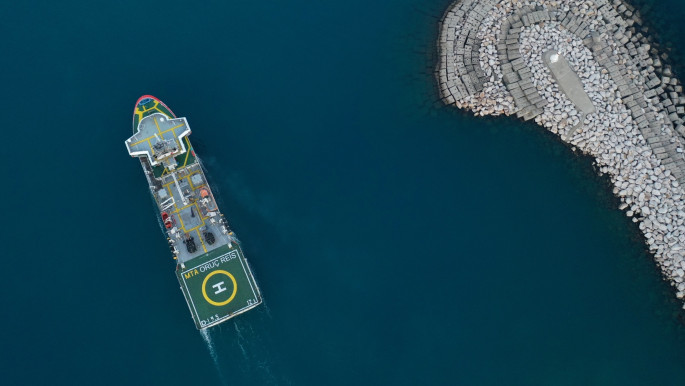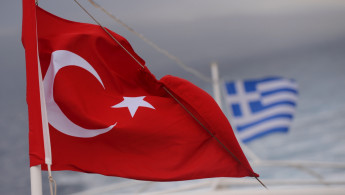How the Kashmir dispute is playing out in the Eastern Mediterranean
Pakistan and Turkey have traditionally been close allies and their ties are currently stronger than ever.
With growing friction between Ankara and Athens in the Eastern Mediterranean, and the Kashmir dispute continuing to fuel tensions between Islamabad and New Delhi, there are signs of a partnership emerging between Greece and India.
Turkish-Pakistani relations
On 23 January, Turkish President Recep Tayyip Erdogan highlighted the importance of Turkish-Pakistani cooperation during a ceremony for the bonding of a Turkish-built Ada-class anti-submarine warfare corvette for the Pakistani Navy, under the MILGEM Project.
The Turkish MILGEM - or National Ship - Project is an ambitious initiative, officially launched in the late 1990s, which seeks to cement the indigenous production of naval ships in Turkey, utilising resources from the Ministry of Defence and the domestic private sector.
Exports to friendly countries have been among the objectives of the project, and Pakistan contributed to this goal by ordering four MILGEM Ada-class corvettes. Erdogan stated that the two countries are "moving a historical brotherhood one step further" and said that they are ready to mutually face regional challenges, alluding to India and Greece.
 |
Pakistan and Turkey have traditionally been close allies and their ties are currently stronger than ever |  |
The MILGEM Project is just one of the milestones related to Pakistani-Turkish cooperation in the defence sector. The deals between the Turkish STM (Savunma Teknolojileri Mühendislik) and the Pakistani Navy represent another interesting case. The Turkish company has won two major contracts with the Pakistani Ministry of Defence, regarding the construction of a Navy Fleet Tanker and the upgrade of the AGOSTA 90B class submarines of the Pakistan Naval Forces Command.
Further to this collaboration in the defence industry sector, the two countries have also been close in terms of military cooperation. In recent years, the Pakistani frigate Alamgir (F260), alongside a special operations team of the Pakistani Navy, has participated in a Turkish drill in the Eastern Mediterranean, an area that has been the epicentre of recent tensions between Ankara and Athens.
 |
|
| Read more: How Gulf reconciliation could impact the Eastern Mediterranean |
Open support for Pakistan is also apparent in the domestic Turkish context. In early 2020, after a meeting between the then interior minister of Pakistan, Ijaz Ahmad Shah, and the Turkish ambassador to Islamabad, sources from the Pakistani Ministry of Interior reported that they were considering a bill to grant dual citizenship to Pakistani and Turkish citizens.
The Kashmir dispute is another fundamental aspect of the special relationship between the two countries. Mainstream Turkish media with international reach have supported Islamabad and criticised Indian policy in Kashmir.
Turkey-based NGOs, such as the Anatolian Youth Association, are constantly pressing for the limitation of New Delhi's role in Kashmir, urging the Turkish government to act as "a voice of Kashmiris". In late 2019, Ali Sahin, an MP of the Turkish ruling AK Party, publicly mentioned that an Islamic mechanism should be formed to monitor and eventually solve the regional historical conflict.
On 13 January, 2021 the foreign ministers of Azerbaijan, Pakistan and Turkey held an official meeting in Islamabad. The conclusions of the trilateral meeting have been summarised in the Islamabad Declaration, where the three officials expressed their intention to support and protect Muslim minorities worldwide and strengthen their overall cooperation, especially in sensitive sectors like a mutual strategy to tackle regional and international terrorism. Of course, the Indian-Pakistani Kashmir dispute, alongside the Greek-Turkish regional antagonism in the Eastern Mediterranean, were on the agenda.
All parties agreed to support each other and reaffirmed their common goals and beliefs for the aforementioned issues. Their mutual objectives have also been highlighted during the recent conflict in Nagorno-Karabakh, where the two foreign powers critically contributed to the prevalence of Baku, both in a military and diplomatic context.
 |
The longstanding alliance between Pakistan and Turkey has prompted Greece and India to consider the mutual benefits of a strategic partnership to counterbalance the current status quo |  |
Prospects for a Greek-Indian partnership
This longstanding alliance between Pakistan and Turkey has prompted Greece and India to consider the mutual benefits of a strategic partnership to counterbalance the current status quo.
Athens and New Delhi have traditionally had good diplomatic relations; however, their relationship has never been extended to the vital sector of defence cooperation, or to alignment over common foreign policy goals. Following the latest escalation in the Eastern Mediterranean, Athens has adopted a more active foreign policy and has been pursuing new alliances to contain the expansion of Turkey's regional footprint.
In October 2020, the Greek Minister of Defence, Nikolaos Panagiotopoulos, held an official meeting with the Indian Ambassador in Greece, Amrit Lugun, to discuss the potential for mutual cooperation regarding the armed forces and defence industries of both countries. The Greek Minister of Foreign Affairs, in a recent meeting with his Portuguese counterpart, highlighted the importance of strengthening ties between the EU and India.
 |
|
| Read more: Why Israel and Turkey could reset fraught relations |
Portugal will be chairing the Council of the European Union for the next six months, therefore Greece acted as a mediator in good faith, aiming to boost India's reach across Europe, and eventually strengthen Greek-Indian diplomatic bonds.
According to sources from the Greek Ministry of Foreign Affairs, Athens is seeking to fortify an anti-Turkish axis, starting from the Aegean and moving all the way to Egypt, the UAE and India. Greece will certainly seek to enhance defence coordination with India, and it is likely that an official agreement or a memorandum relevant to the defence sectors of both countries will be pursued in the following months.
India's location and vast population establish a natural obstacle for Turkey's geopolitical aims, thus the Greek approach to New Delhi certainly makes sense. Assessing this potential cooperation vis-à-vis the Turkish-Pakistani alliance, it is apparent that Greece and India have a long way to go.
While ties between Ankara and Islamabad have already matured and are overtly reflected in the international system - from the formation of a mutual foreign policy to a major joint defence project - relations between Athens and New Delhi still remain at a very basic level. It is now up to the Greek government and its diplomatic efforts whether this alliance in the making could have a significant impact on the global scene.
Alex Kassidiaris is an International Security Advisor based in London. He holds a master's degree from the War Studies Department of King's College London and his research interests include security and politics in the Eastern Mediterranean and Middle East.
Follow him on Twitter: @AlexKassidiaris



